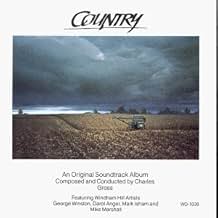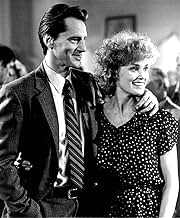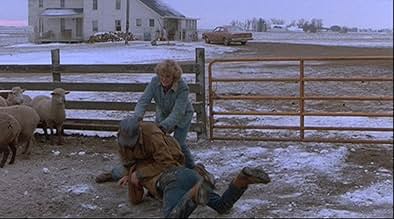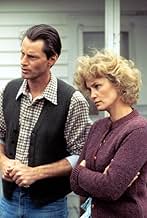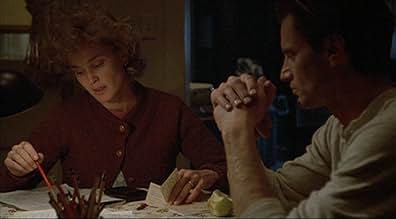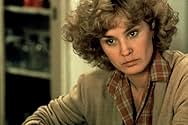IMDb RATING
6.6/10
2.3K
YOUR RATING
Gilbert Ivy and his wife Jewell are farmers. They seem to be working against the odds, producing no financial surplus. Gilbert has lost hope of ever becoming prosperous, but his wife decides... Read allGilbert Ivy and his wife Jewell are farmers. They seem to be working against the odds, producing no financial surplus. Gilbert has lost hope of ever becoming prosperous, but his wife decides to fight for her family.Gilbert Ivy and his wife Jewell are farmers. They seem to be working against the odds, producing no financial surplus. Gilbert has lost hope of ever becoming prosperous, but his wife decides to fight for her family.
- Nominated for 1 Oscar
- 1 win & 3 nominations total
Theresa Graham
- Marlene Ivy
- (as Therese' Graham)
Robert L. Somers
- Grain Elevator Operator
- (as Robert Somers)
Frank Noel
- Semi Driver
- (as Frank Noel Jr.)
Warren Duit
- Preacher
- (as Rev. Warren Duit)
James N. Harrell
- Bank Officer, Jim
- (as James Harrell)
- Director
- Writer
- All cast & crew
- Production, box office & more at IMDbPro
Storyline
Did you know
- TriviaSecond theatrical feature film release from then new Walt Disney Pictures' new studio branding of Touchstone Films. The first had been Splash (1984) which had debuted earlier in 1984 - the same year that 'Country' premiered. The name was later re-branded to Touchstone Pictures in 1987.
- GoofsAround the 45-minute mark, when Jewell picks up the mail, the baby in the stroller is happy and gurgling. As the camera pans up to Jewell's face as she begins to read the letter, the sound-effect of a baby crying is heard -- though the actual baby's face is still in-frame and appears happy, as before.
- Quotes
Tom McMullen: Listen, you owe the money, nobody forced you to borrow it.
- SoundtracksHome
Written by George Winston
Featured review
In 1984, there were three films produced about farm life in the midwest. The first, and best film, "Places in the Heart" showcased an older form of life, a world where the farmer's only real enemy was nature; human or mother. The second two - "The River" and this film, "Country" - focused on the modern (for 1984, that is) struggles of farming the land. Of those two films, "Country" is the better. The real curious problem with "The River" is that it failed to show the average person's life. It felt more like a disaster movie, and the farmer seemed more like a poor, pathetic loser than a noble man trying to stay alive.
The main thing that holds it all together is Richard Pearce, a director who makes personal, legitimate films as opposed to big events and images. Five years earlier, he covered similar ground in his first film, "Heartland". I'm a firm believer that great cinematography can make a great film. If something is worth looking at, the first steps are already covered. It's not that David M. Walsh is necessarily shooting in a mindblowing, new way, but Pearce gives him wonderful things to photograph. There's so much time given to just let things happen. The final scene is a perfect example. The wordless, drawn-out connection of two humans. It seems to go forever. This film lets you watch at the most perfect, crucial moments.
The actors. What can I say about them? They're utterly convincing, and that's got to be the main and almighty concern for any film-goer. Jessica Lange, Sam Shepard, and Wilford Brimley are all more human than some of the bigger stars that might have been picked to act in such a film. They still have that sense of not being watched, at least enough so that they can live a character untouched. Lange, who I've seen in several films, never quite impressed me like she does here. Brimley, the glorious character actor who made a career in the 1980s playing 'that guy' in quiet dramas, is very much welcome here. In fact, I can't ever remember an instance when I regretted seeing him on film. He adds needed personality to the mix. The children (played by Theresa Graham and Levi Knebel) don't ever feel less than perfectly real.
There are a lot of parts to this film, passages and images. In fact, that's what most makes it all work. If one thought feels out of place, humanity strikes again like lightning. Yes, there is the obligatory Big Statement scene, where the music swells and all poor farmers rise up against the Man. And yes, it is almost that bad. But even though it might make your eyes roll, there's far too much real life and human subtlety on display in "Country" for such a tired scene to crush it.
Richard Pearce directs true, quiet dramas. If you want more of what you felt watching this, seek out these other films by him - Threshold (1981), The Long Walk Home (1990), A Family Thing (1996).
The main thing that holds it all together is Richard Pearce, a director who makes personal, legitimate films as opposed to big events and images. Five years earlier, he covered similar ground in his first film, "Heartland". I'm a firm believer that great cinematography can make a great film. If something is worth looking at, the first steps are already covered. It's not that David M. Walsh is necessarily shooting in a mindblowing, new way, but Pearce gives him wonderful things to photograph. There's so much time given to just let things happen. The final scene is a perfect example. The wordless, drawn-out connection of two humans. It seems to go forever. This film lets you watch at the most perfect, crucial moments.
The actors. What can I say about them? They're utterly convincing, and that's got to be the main and almighty concern for any film-goer. Jessica Lange, Sam Shepard, and Wilford Brimley are all more human than some of the bigger stars that might have been picked to act in such a film. They still have that sense of not being watched, at least enough so that they can live a character untouched. Lange, who I've seen in several films, never quite impressed me like she does here. Brimley, the glorious character actor who made a career in the 1980s playing 'that guy' in quiet dramas, is very much welcome here. In fact, I can't ever remember an instance when I regretted seeing him on film. He adds needed personality to the mix. The children (played by Theresa Graham and Levi Knebel) don't ever feel less than perfectly real.
There are a lot of parts to this film, passages and images. In fact, that's what most makes it all work. If one thought feels out of place, humanity strikes again like lightning. Yes, there is the obligatory Big Statement scene, where the music swells and all poor farmers rise up against the Man. And yes, it is almost that bad. But even though it might make your eyes roll, there's far too much real life and human subtlety on display in "Country" for such a tired scene to crush it.
Richard Pearce directs true, quiet dramas. If you want more of what you felt watching this, seek out these other films by him - Threshold (1981), The Long Walk Home (1990), A Family Thing (1996).
- SteveSkafte
- Apr 13, 2010
- Permalink
- How long is Country?Powered by Alexa
Details
- Release date
- Country of origin
- Language
- Also known as
- Cosechas de ira
- Filming locations
- Black Hawk County, Iowa, USA(locations: Readlyn and Waterloo)
- Production companies
- See more company credits at IMDbPro
Box office
- Budget
- $10,000,000 (estimated)
- Gross US & Canada
- $9,640,000
- Opening weekend US & Canada
- $24,443
- Sep 30, 1984
- Gross worldwide
- $9,640,000
- Runtime1 hour 45 minutes
- Sound mix
- Aspect ratio
- 1.85 : 1
Contribute to this page
Suggest an edit or add missing content





